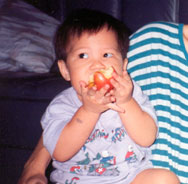Why start early?
Good oral health is important at all stages of life especially during the early years of a child’s life.
Strong and wholesome growth and development of body and mind requires good nutrition.
- A healthy dentition helps the growing child to ingest a balanced diet and contributes towards achieving their full potential in life.
- Healthy eating and good feeding practices not only improve the overall nutritional status of children, but also their oral health.

Your child needs good milk teeth to enjoy fruits!
- Children with poor oral health may fail to thrive. Studies have shown that children with severe dental caries weigh less than those with good teeth.
- Children who suffer from dental caries early in life are also more likely to develop caries in their permanent dentition later on.
A healthy mouth is the result of regular oral health care.
Oral health care habits must start from young. Parents and caregivers need to know the risks to oral health and take some simple but necessary steps to prevent oral disease from starting in young children.
How does a healthy mouth contribute to healthier life?
Good oral health improves general health and well-being.
- Optimum oral function allows us to eat and enjoy healthy food, builds self-esteem and increases confidence in social interaction.
- Maintaining good oral health throughout life helps protect our general health and reduce the risk of serious diseases. There is increasing evidence linking poor oral health to heart disease, strokes, poor sugar control in diabetics and babies with low birthweight.
A lifetime of healthy smiles starts from the deciduous dentition.
- Take good care of the deciduous dentition (milk teeth) to ensure its proper function. Apart from adequate chewing of food and digestion, the deciduous dentition is necessary for good speech development.
- A healthy set of teeth also promotes self-esteem and well-being. Proper development and function of deciduous teeth help the jaw bones to grow and provide enough space for the succeeding permanent dentition.
- Properly formed and well-arranged permanent teeth are more likely to last a lifetime.
A child’s teeth are exposed to the risk of dental caries as soon as they appear in the mouth. Tooth decay in infants and toddlers is called early childhood caries (ECC). The upper front teeth are usually the first teeth to show signs of ECC.
- Inappropriate feeding practices and poor dietary habits have been associated with dental caries formation in young children. Dental plaque (a thin, sticky film of bacteria that covers teeth) feeds on dietary sugar to produce an acid. ECC occurs when teeth suffer repeated acid attacks from frequent exposure to sugary liquids or foods. This often leads to toothaches, gum infections and early loss of important deciduous teeth if the condition is left untreated.
- It is possible for mothers or other caregivers to pass caries-causing bacteria (mutans streptococci) to an infant. This puts the child at an increased risk for dental caries. These bacteria are passed to the child through saliva. Avoid sharing eating/drinking utensils and other saliva-to-saliva contact with your child. Mothers, family members and caregivers should also seek dental care to eliminate oral disease in their mouths and lower their levels of caries-causing bacteria.
- Poor oral hygiene is also associated with dental caries in infants and young children.
What steps can I take to ensure an early start to good oral health?
|
The key to success is to start early! Because young children are not able to control the risks, parents and caregivers who care about oral health, know the correct oral health care practices and the risks to avoid will give the child an early start to good oral health.
|
 Start the child on a lifetime of good oral care habits |
|
4 Steps for Early Oral Health Care
|
- Cultivate healthy eating practices from young.
- Never put a young child to bed with a bottle, unless it only contains water. While breastfeeding is best for baby, wean from any bottle-use by age 12 – 14 months when more teeth have erupted in the mouth. The teeth will be exposed to risks of caries when the first tooth erupts at about 6 months old.
- Avoid encouraging the sweet tooth in young children. You will be helping your child towards good eating habits for life.
- Clean your child’s mouth and teeth daily.
Use a small towel to clean a baby’s mouth during bathtime and continue with a suitable toothbrush as teeth appear. It is a good habit to clean the mouth with plain water after every feed or meal. - Check your child’s teeth regularly.
- Get to know your child’s teeth when they first appear and are healthy. ‘Lift the lip’ monthly. This is a simple procedure you can use to check a child’s mouth for dental plaque and any changes in the appearance of the teeth.
- Look for early signs of dental caries. This may appear as white lines or patches on tooth surfaces along the gum line.
- Take your child for the first dental check-up by age of one year.
The first visit to the dentist should be a pleasant one – free from any fear or pain. This promotes a lifelong friendship with the dentist.
A healthy mouth offers benefits for a healthier life. We can take steps to prevent oral disease. Teeth are made to last a lifetime if we start oral health care early, nip the risks in the bud and maintain a lifelong partnership with the dentist.
Start Early – Healthy Mouth for a Healthier Life!

Healthy teeth from young – an early start towards a lifetime of healthy smiles
| Last reviewed | : | 23 August 2019 |
| Writer | : | Dr. Chew Yoke Yuen |
| Accreditor | : | Dr. Cheng Lai Choo |
| Reviewer | : | Dr. Sharol Lail b. Sujak |







